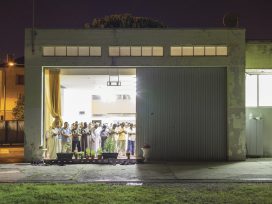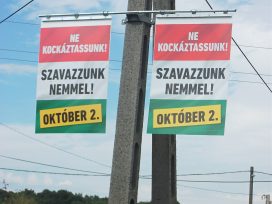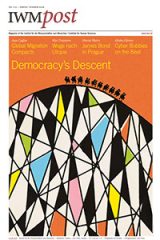

In collaboration with
Institute for Human Sciences
The Institute for Human Sciences / Institut für die Wissenschaften vom Menschen (IWM) is an independent institute for advanced study in the humanities and social sciences. Since its foundation in 1982, it has hosted more than 1500 scholars, journalists and translators from all over the world. Many of the Institute’s Permanent and Visiting Fellows are regular contributors to Eurozine or its focal points The World in Pieces and Ukraine in European Dialogue (see below).
Website: www.iwm.at
X (formerly known as Twitter): https://x.com/iwm_vienna
Youtube: https://www.youtube.com/channel/UCIwFQ_iRX8w8D0NKJo41Ihw

Articles

The political geographies of Muslim visibility
Boundaries of tolerance in the European city
The Muslim presence in European cities is often concealed through formal restrictions on mosques and other signs of religiosity. Yet Muslims are also exposed as threats to the public order. Claiming full rights to participation in public space means confronting the divided political geographies of visibility, argues Luiza Bialasiewicz.

Controversies over Muslims refusing to shake hands with non-Muslims are typical of the conflicts affecting today’s multi-religious societies. Appeals to the law are not the answer: processes of social self-regulation need to take their course beyond formal authority, argues Miloš Vec.

Fidesz’s constitutional counter-revolution has reversed the process of democratization begun in Hungary in 1989. Seeking reasons for Hungary’s ‘backsliding’, Gábor Halmai argues that democratic culture is more crucial than formal legality to guaranteeing rule of law. Hungary challenges the EU’s ability to prevent illiberal democracies emerging in its midst.

If the financial crisis divided the EU between creditors and debtors, opening a gap between North and South, the refugee crisis re-opened the gap between East and West. What we witness today, writes Ivan Krastev, is not what Brussels describes as a lack of solidarity, but a clash of solidarities: national, ethnic and religious solidarity chafing against our obligations as human beings.
Focal points

Inspired by a lecture that Clifford Geertz delivered in 1995 at the Institute for Human Sciences in Vienna, this focal point engages with ‘deep diversity’, ‘a sense of dispersion, of particularity, of complexity and of uncenteredness’ rather than unified world order. It follows the launch of a research programme of the same name at the institute in January 2023.

Post-revolutionary Ukrainian society displays a unique mix of hope, enthusiasm, social creativity, collective trauma of war, radicalism and disillusionment. With the Maidan becoming history, the focal point ‘Ukraine in European Dialogue’ explores the new challenges facing the young democracy, its place in Europe, and the lessons it might offer for the future of the European project.
Projects and publications

